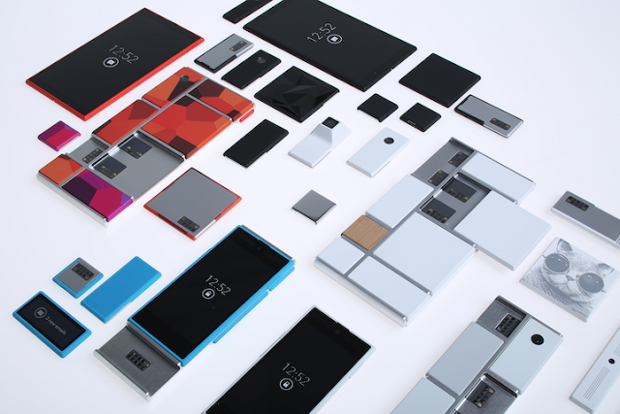Project Ara and Phonebloks are destined for the modular trashcan


You know what's cool? Apart from a billion dollars?
This "M-Blocks" robot project where cubes roll around and self-assemble themselves Terminator hunter/killer style.
That's some cool modularity. That can modularise itself right over here and I'd be happy to welcome my new self-assembling robotic overlord into my life.
But there's some uncool modularity coming our way, and it's smartphone shaped...
Blocky
Technologists love modular. I think it's because we all grew up playing with LEGO®. Something about hardware and software engineering seems to scream "make me modular and put me together as you will!"
When Phonebloks started doing the rounds last month I glanced at it thought, "huh, modules" and ignored it. If you haven't heard of it, the idea is that rather than buying a phone where someone has thoughtfully lumped all the components together for you in one unit, you buy a bunch of modules and snap them together however you like.
On paper -- like many madcap technologist ideas -- this seems like a plan. Want more storage? Snap out the module you don't like and put in one that you do. Better camera? Same idea. Over time, you wouldn't necessarily ever buy a new phone, you just keep swapping bits out evolving the phone to suit your needs.
Where this gets -- well, not so much interesting, but noisy -- is that Motorola have lumped in with Phonebloks to collaborate on the project together under the name Project Ara. (It turns out Motorola had been working on something similar internally for some time.)
Motorola's involvement is quite fitting really. It's like a modular business plan where they've slotted in a new partner that's able to create more buzz around the idea.
I give it a year
It does look beautiful. The part of me that's still a proper geek sighs at how clever and well executed this is. But there are some pretty serious problems with this project that likely mean that in a year's time we'll all be saying "Ara, what?" as opposed to "Hey, look at my cool new Ara phone!"
First up, there's cost. The market likes cheap smartphones. Any attempt to make a smartphone modular will drive up the cost for the simple reason it's more complex to manufacture. It's also more complex to support as you end up with "n" different combinations of hardware the user can use, as opposed to the two or three you punt out of the door. Modular phones will always be more expensive.
Secondly, there's sales. The industry is geared around selling airtime contracts with a sum of money grafted on to the monthly payments in which the customer buys a phone. Having the customer upgrade at the end of the contract results in a ton of money flowing through the system, which everyone likes. In this new system there's no incentive to upgrade. If the phone is unsatisfactory in some way, just swap out the component. And cheaper pay-as-you-go contracts means there's less money sloshing around.
Thirdly, there's complexity. PCs started out modular and since 1981 they've been getting less and less modular. Laptops are distinctly un-modular, yet are the most popular PC form factor. All-in-ones are gaining in popularity, but are similarly un-modular.
Back in the day people used to crack open and fiddle and upgrade with their PCs. That doesn't happen now because it was a faff, plus PCs became so cheap junking the thing and starting from scratch became the easiest option by a country mile. A modular phone suggests that this trend was wrong and that what normal people wanted to do was endlessly fiddle with and upgrade their hardware.
That's obviously not true. If we've learnt anything over recent years is that customers want cheap, reliable, simple kit that just works.
Like Ubuntu Edge, the only market for a modular phone are technologists who just love to fiddle.
Fourth, there's reliability. I can't remember the last time I got a phone to last two years without it needing replacing, and that's with all the components soldered together and sealed in a nice tidy box. If those components are all loosely connected together using macroscopic connectors it's either not going to be reliable, or drive up the cost even more.
Finally, there's control. And this is the big one. Android may be the last open thing that happened in the post-PC era. Although Google put Android out there, they've been for years considerably luke warm about making it as open as it can be. Smartphone manufacturers are not going to want to open up their experience to competitors. They want to design a device and get it into the hands of their customers. If they have a USP (unique selling point) they're not going to want that designed in a such a way it can be snapped out and used to enhance a competitors device.
Conclusion
I've said "finally", but maybe there is a "finally finally"...
Really, with this, who cares? This is yet another of these ideas that technologists get all excited about, but totally misses how normal consumers think.
Normal people just want to Snapchat, email, browse the web, etc. As long as it can do that and not go wrong, they're fine as they are.
If it ain't broke, don't fix it -- especially not in the most complicated and artificially disruptive way possible.
What do you think? Post a comment, or talk to me on Twitter: @mbrit.